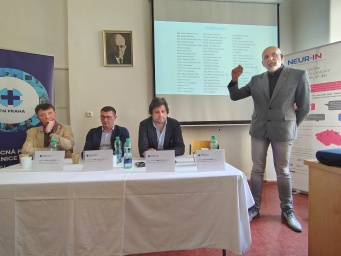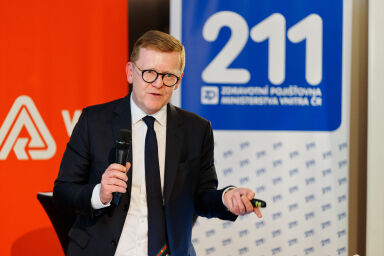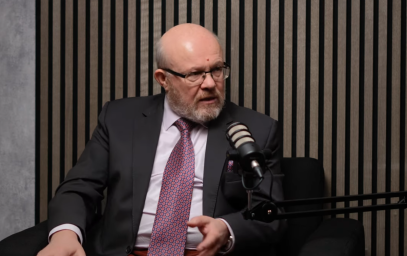The health of the population has a fundamental and irreplaceable impact on the competitiveness of companies, national and European economies. Because of this, and because of the relentless demographic trend, it is high time to put prevention and people’s commitment to a healthy lifestyle at the heart of the concerns of companies and politicians. The EU’s role should be primarily one of coordination. In a Eurodebate with Zdravotnický deník, Ekonomický deník and Česká justice on the topic „The Future of Europe – an Agenda for the New European Parliament and the European Commission“, Ondřej Krutílek (ODS party), candidate for the European Parliament for the Together coalition, and experts from the automotive, energy and legal sectors, agreed.
According to Ondřej Krutílek, a candidate for the European Parliament, the health of the population plays a crucial role in terms of the competitiveness of businesses, the national economy and the economy of the European Union. He stressed, however, that this area must be approached sensibly. „It is a matter of finding a measure so that national and European policies work together and, for example, a minor illness is not dealt with with the proverbial cannon, which on the contrary undermines competitiveness, whether regulatory or administrative,“ Krutílek said.

With regard to the division of competences between the member states and the EU institutions, Krutílek believes that the role of the European Union should be rather coordinating and should consist in finding good practices applicable across Europe. „In this respect, I appreciate the emphasis on prevention, on the fight against antibiotic resistance or the emphasis on mental health, which has deteriorated demonstrably, especially after the epidemic,“ said the MEP candidate.

Let’s prepare for demographic changes
Martin Hájek, director of the Czech Heating Association, emphasised in the Eurodebate that the Czech Republic must prepare for the gradual ageing of the population and the lengthening of working careers. „This concerns all sectors, including the energy sector. Prevention is of course key, but I know from personal experience that we have a growing problem with the provision of health services, where appointment times for dentists or various specialists are often unbearable,“ Hájek pointed out. Even a non-expert, therefore, knows that late health interventions – whether due to underestimation of prevention or limited availability of care – ultimately lead to higher health damage and, of course, economic damage due to higher morbidity and lower work performance.

The fact that Europe is undergoing a significant demographic transformation and that we are witnessing a gradual ageing of the European population was also identified as key in the discussion by lawyer Eva Kinnertová from PORTOS. „Because of this, it will be necessary to put more emphasis on preventive healthcare and early diagnosis of cancer. It is also important to strengthen the general awareness of the population about the importance of prevention and the specific possibilities of individual preventive programmes offered by health insurance companies,“ said Kinnertová. She added: „Health problems are often the reason for early retirement of employees, which increases pressure on the social system and further drains working capacity. At the same time, many sectors today depend on the willingness of professionals to work beyond retirement age.“

According to Kinnertová, the future decline in the workforce cannot be relied upon to be met by citizens from outside the EU, which is why states should rely primarily on affordable care and prevention. „Affordable medical care together with quality prevention programmes are the key not only to improving the overall health of the Czech population, and thus to ensuring the largest possible number of the necessary workforce, but also to keeping the rising costs of healthcare from public budgets at an acceptable level,“ she said.
A wide range of ways to motivate
That productivity and the ability to perform consistently in line with the company’s requirements over the long term are closely linked to health is the view of EY’s CEE Automotive Partner Petr Knap. „As the population continues to age, the relatively low healthy life expectancy may play against the Czech Republic. And probably only in the short term will we be able to ‚afford‘ to virtually not employ people over the age of 50. At the same time, these are loyal and often very efficient employees who could fill a variety of positions and do a lot of work, at least on a part-time basis,“ Knap said in the Eurodebate.

Michal Kadera, director of external relations at Škoda Auto, described how to emphasize prevention and a healthy lifestyle in the working environment in the Euro debate, using the example of the Škoda Auto car company. „The topic of the health of our employees is very important for our company. That is why the area of wellbeing is also one of our social sustainability priorities. We have long focused on promoting prevention among all employee groups through the Škoda Polyclinic and the Health Services and Ergonomics unit. We are one of the first manufacturing companies to be completely smoke-free. We motivate our employees to adopt a healthy lifestyle not only through high-quality factory catering with a selection of healthy meals, but also, for example, through ŠkoFit sports and charity challenges, through which employees help charity projects by moving around. In recent years, we have also increasingly focused on the topic of mental health, for example with the specific ŠkodaStress website, where employees can learn about ways to manage stress and promote mental health,“ Kadera said in the Eurodebate.
He added that Škoda Auto offers its employees opportunities to discuss prevention and healthy lifestyle topics through workshops, community activities, team talks, as well as individual anonymous psychological consultations. „We are actively responding to current events in the automotive industry, both in the Czech Republic and worldwide. We bring new topics to support our employees and regions with information, professional help or events,“ declared Kadera.
Jakub Němec
Photo: Radek Čepelák






